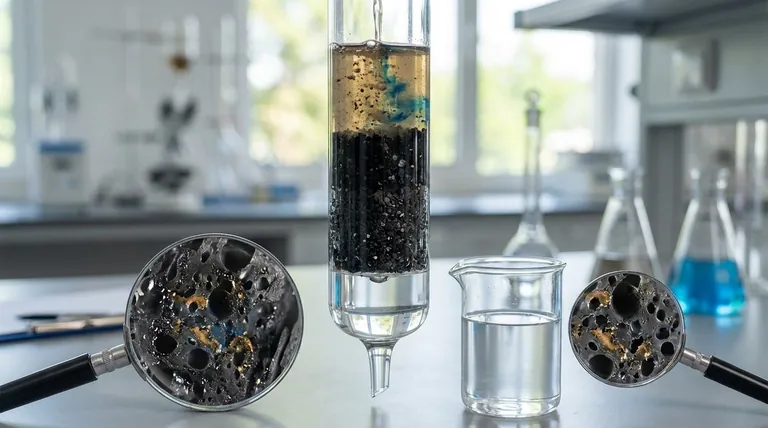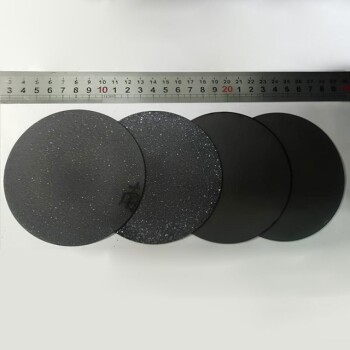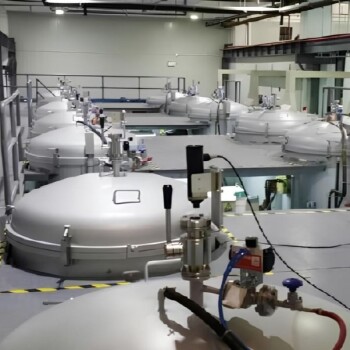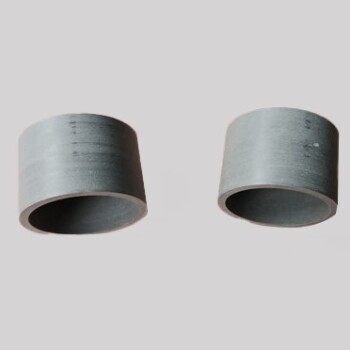At its core, biochar improves water quality by acting as a highly effective filter. Its incredibly porous structure and reactive surface chemistry allow it to physically trap and chemically bind to a wide range of contaminants, removing them from the water.
The true value of biochar is not as a single product, but as an engineered material. Its ability to purify water depends directly on the source material it was made from and the temperature at which it was produced, which determine its effectiveness against specific pollutants.

The Science Behind Biochar's Purification Power
To understand biochar's role, you must look at its two primary mechanisms of action: physical adsorption and chemical interaction. These properties are created during pyrolysis, the process of heating organic material (feedstock) in a low-oxygen environment.
Physical Adsorption: A High-Surface-Area Sponge
Pyrolysis creates a vast network of microscopic pores within the carbon structure. This gives biochar an exceptionally high surface area relative to its volume—a single gram can have the surface area of a football field.
This structure acts like a physical maze. As water flows through it, large organic molecules like pesticides, herbicides, and industrial chemicals (e.g., polycyclic aromatic hydrocarbons or PAHs) become trapped within these pores.
Chemical Adsorption and Surface Chemistry
The surface of biochar is not inert. It contains various functional groups (like carboxyl and hydroxyl groups) that carry a negative charge. This allows biochar to attract and bind with positively charged ions through a process called ion exchange.
This mechanism is particularly effective for removing dissolved heavy metals like lead, cadmium, copper, and zinc. It is also the primary way biochar can capture excess nutrients like ammonium (a form of nitrogen).
Creating a Microbial Habitat
The same pores that trap contaminants also provide an ideal habitat for beneficial microorganisms. These microbes can colonize the biochar and form a biofilm.
This "living filter" adds a biological purification component. The microbes can break down or metabolize certain organic pollutants that have been adsorbed onto the biochar, effectively regenerating some of the filter's capacity over time.
Not All Biochar Is Created Equal: Key Factors
The effectiveness of biochar is not universal; it is highly dependent on how it is made. Understanding these production variables is critical for selecting the right material for a specific water quality issue.
The Role of Feedstock
The organic material used to create biochar is known as the feedstock. Different feedstocks produce biochars with different properties.
- Woody Feedstocks (e.g., wood chips, nut shells) tend to produce biochar with high surface area and a rigid pore structure, making them excellent for adsorbing organic compounds.
- Manure and Biosolid Feedstocks often result in biochar with higher nutrient content and more mineral ash, which can enhance its ability to bind with heavy metals and other nutrients.
Pyrolysis Temperature: The Deciding Factor
The temperature of the pyrolysis process is perhaps the single most important variable.
- Low Temperatures (300–450°C) preserve more of the chemical functional groups on the biochar's surface. This enhances its ability to capture contaminants via ion exchange, making it better for some heavy metals.
- High Temperatures (600–800°C) create a more porous structure with a greater total surface area. This maximizes physical adsorption, making it more effective for filtering out large organic molecules.
Understanding the Trade-offs and Limitations
While highly effective, biochar is not a universal solution. An objective assessment requires acknowledging its limitations.
Potential for Leaching
If not produced correctly or if made from contaminated feedstock, biochar itself can leach substances into the water. This can include salts, ash, and even heavy metals that were present in the original organic material. Always source biochar from a reputable producer who can provide a chemical analysis.
Saturation and Lifespan
Biochar’s adsorption sites are finite. Over time, they will become saturated with contaminants, and the material will lose its effectiveness. At this point, the biochar must be replaced. The lifespan depends entirely on the type and concentration of pollutants it is filtering.
Specificity of Contaminants
No single biochar is optimized for all pollutants. A high-temperature biochar designed to remove pesticides may be ineffective at capturing nitrates. The choice of biochar must be specifically matched to the target contaminant you need to remove.
Matching Biochar to Your Water Quality Goal
To apply this knowledge effectively, you must define your primary objective. The right biochar is the one engineered to solve your specific problem.
- If your primary focus is removing organic pollutants (pesticides, industrial chemicals): Seek a high-surface-area biochar, typically produced from woody feedstock at high temperatures (>600°C).
- If your primary focus is capturing heavy metals (lead, cadmium, zinc): Prioritize a biochar with high ion exchange capacity, often made at lower to moderate temperatures to preserve surface functional groups.
- If your primary focus is reducing nutrient runoff (ammonium, phosphate): Look for biochars specifically designed for nutrient management, which may be derived from manure or engineered with modified surface chemistry.
By treating biochar as an engineered material rather than a simple commodity, you can effectively harness its power to protect water resources.
Summary Table:
| Biochar Application | Recommended Feedstock & Pyrolysis Temperature | Primary Contaminants Targeted |
|---|---|---|
| Removing Organic Pollutants | Woody Feedstock, >600°C | Pesticides, Herbicides, PAHs |
| Capturing Heavy Metals | Various Feedstocks, 300-450°C | Lead, Cadmium, Copper, Zinc |
| Reducing Nutrient Runoff | Manure/Biosolids, Engineered Chemistry | Ammonium, Phosphate |
Need a reliable filtration solution for your laboratory? KINTEK specializes in high-quality lab equipment and consumables. Our products support advanced water purification research and applications, including the use of engineered materials like biochar. Let us help you equip your lab for superior environmental analysis. Contact our experts today to discuss your specific needs!
Visual Guide

Related Products
- Conductive Carbon Cloth Carbon Paper Carbon Felt for Electrodes and Batteries
- Molybdenum Vacuum Heat Treat Furnace
- Laboratory CVD Boron Doped Diamond Materials
- Touchscreen Automatic Vacuum Heat Press
- Vacuum Sealed Continuous Working Rotary Tube Furnace Rotating Tube Furnace
People Also Ask
- What are the disadvantages of centrifugal filtration? High Costs, Maintenance, and Product Damage Risks
- What are the important parameters in thin film deposition with magnetron sputtering technique? Master Your Film's Properties
- What are the factors affecting sintering? Master the Key Variables for Optimal Densification
- What is the difference between thermal and catalytic pyrolysis? Maximize Yield vs. Improve Oil Quality
- What is sputter ceramic film? A High-Tech Solution for Superior Heat Rejection & Clarity
- What is the difference between bio-oil and biofuel? A Guide to Renewable Fuel Types and Uses
- What temperature ranges do scientific laboratory and pharmacy freezers typically control? A Guide to Sample Integrity
- Why is the use of a high-temperature drying oven necessary for aluminum sludge recycling? Ensure Data Precision


















